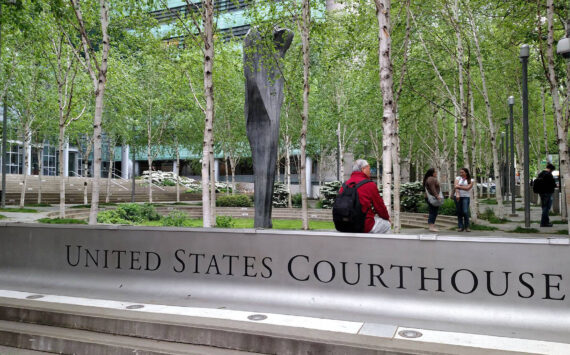Marcus Courtney, the brash, 33-year-old leader of the Washington Alliance of Technology Workers, or WashTech, has just walked into his office and let out a yelp. He picks up the phone and makes a series of calls. “I didn’t burn you,” he insists during the first. “I thought we had a deal,” he complains during the next.
The first party on the phone, an Associated Press reporter, is furious at Courtney for giving another media outlet an outsourcing-related story that she thought was exclusive to her. She had apparently gotten wind of a similar story in the works at The Wall Street Journal. Courtney tells her that yes, he had contacted the Journal first, but their reporter had decided not to do the story, with the understanding that Courtney would “shop it around” to other media as an exclusive. But The Wall Street Journal had changed its mind—until, Courtney explains later, he confronted the Journal reporter, who abandoned the story. So AP had its exclusive. Sent over the wire on Tuesday, April 27, it concerned a U.S. congressional delegation’s visit to India that was paid for by a pro-outsourcing industry group there.
Perhaps more interesting than WashTech’s behind-the-scenes brokering of the information is the fact the union’s own research was the basis for the AP scoop. WashTech had procured public documents at congressional offices in D.C., and in addition to releasing them to AP, the juicy financial details of the congressional trip to India were posted on WashTech’s Web site (www.washtech.org) with a call to take action: “Tell your members of Congress you believe that outsourcing is a race to the bottom for all workers.”
Such is an average day in the anti- outsourcing war room that is WashTech’s offices on Eastlake Avenue East. Pounding away at an issue so hot that it has become part of the presidential race, WashTech has attracted national and even international attention. The organization is not just regularly quoted by the likes of The New York Times, The Wall Street Journal, BusinessWeek, and CNN. It is a behind-the-scenes force that has planted numerous stories with those news outlets and others after doing much of the investigative legwork. The union has boosted its news-making capability by hiring professional freelance journalists. It has also been aided by leaks about corporate practices from its embittered and knowledgeable constituency: high-tech workers who, in the wake of the dot-com bust, have watched thousands of high-skilled, well-paying jobs go to countries with lower labor costs, like India and China.
“They’ve been very effective in getting the message out,” says Stan Sorscher, a staffer at Boeing’s professionals union, the Society of Professional Engineering Employees in Aerospace (SPEEA), who has worked with WashTech on anti-outsourcing lobbying efforts. House members Jay Inslee, D-Bainbridge Island, and Adam Smith, D-Tacoma, have met repeatedly with WashTech and its members. “It’s kind of an open-door policy Adam has with WashTech,” says Smith spokesperson Lars Anderson. Inslee says the union has proved useful by putting him in touch with workers who have lost their jobs to outsourcing. Working with the union, Smith and Inslee jointly requested that the federal General Accounting Office conduct a study on how outsourcing is affecting the domestic economy. That study is due out this summer. They have also sponsored a bill that would extend federal Trade Adjustment Assistance, including extended unemployment benefits, to high-tech and other service workers who have been laid off due to international trade. (Currently, only manufacturing workers can get such assistance.)
WashTech has developed allies at the state level, as well, including Rep. Zack Hudgins, D-Tukwila. Hudgins, who had worked for Amazon.com in customer service and marketing before getting the ax along with hundreds of co-workers on a January day in 2001, was already a WashTech member when he was elected to office. He worked with the union to co-sponsor several pieces of anti-outsourcing legislation in the last legislative session. One, linked to a media story instigated by WashTech that revealed the state was contracting with Indian companies, would have prohibited the state from outsourcing work. That and other bills failed to pass last session. But Hudgins says he’s intending to introduce similar bills in the 2005 session.
“WashTech is a key piece in gathering new information,” says Hudgins. He adds that the union’s news-gathering mode of operation constitutes a “different way” of organizing. Courtney agrees. Most unions, he says, are focused on contract bargaining. But WashTech, despite some major efforts in this arena at Amazon and elsewhere, has been able to launch only a handful of bargaining units, representing about a dozen people. So while being subsidized by its parent union, the Communications Workers of America, WashTech has turned to what Courtney calls “this innovative, Web advocacy and networking approach to building a labor movement.”
“We need to build popular support,” he says. And his potential supporters have different demands than the traditional labor base. “We continually hear from white-collar workers that they want information,” he says, and by information they mean the raw, hard data. “Can they make their case?” is the question that is asked of union organizers.
WashTech had better make a good case, because its audience might not be particularly union inclined. In a national survey of high-tech workers commissioned late last year by WashTech, 41 percent said they were Republican and only 26 percent identified themselves as Democrat.
The Web is a natural tool to communicate with these workers. Taking a cue from the Howard Dean campaign, WashTech is also using the Web to do targeted fund-raising. WashTech has posted an anti-outsourcing advertisement on its site that it would like to place in national publications, and it invites people to click to learn how to donate money for the ad campaign. In two weeks, the union has raised $6,000, but it still has a long way to go to reach the $90,000 it takes for a three-quarters-page New York Times buy. It still has a long way to go to build a labor movement among high-tech workers, too. WashTech has only 460 dues-paying members and 17,000 newsletter subscribers.
Still, the union has clearly found an issue that resonates. That happened only a year and a half ago, four years into the union’s existence. The focus on outsourcing began when a Microsoft insider leaked to the union a PowerPoint presentation by Windows executive Brian Valentine. The presentation was titled, “Why Think About India Now,” and it noted, “Quality work at 50 to 60 percent of the cost—that’s two heads for the price of one.”
“We knew this was a powerful and significant issue,” says Courtney, a former Microsoft temp worker. “Microsoft is basically the symbol of American capitalist success. . . . If Microsoft was thinking about doing this, and was that aggressive about it, then the economy had really changed.” Gone was the myth, Courtney says, that American high-tech workers were going to be the winners in the global economy.
Courtney and his board of directors spent the next seven months planning their strategy. It so happened that around the same time, BusinessWeek had approached the union, wanting its help on a piece about outsourcing it planned. The union fed BusinessWeek the Valentine presentation as well as sources and other material. In February 2003, the magazine put the story on its cover under the headline, “Is Your Job Next?” It had a huge impact, and WashTech had geared up to capitalize on it with a revamped Web site devoted to the issue. “That really positioned us as the one organization in the country taking on the white-collar outsourcing issue,” Courtney says.
Four months later, The New York Times came out with another WashTech-prompted story. The union had given the paper a recording of IBM executives talking about the need for ramped-up outsourcing, despite a likely backlash from employees. Inside sources had leaked the recording to WashTech. “That put us into the stratosphere,” Courtney says. WashTech was besieged with press inquiries.
As the issue has come alive in the national dialogue, WashTech has kept up a steady stream of newsworthy events. One of its most recent was the launch a few weeks ago of a Web-based “offshore tracker” (www.techsunite.org/offshore) that aspires to document, company by company, the number of jobs sent overseas. The union has also put forward people who can show the human face of outsourcing. One, Mercer Island–based Myra Bronstein, has become a media phenomenon. Last year, the 40-year-old was part of a group of high-paid software testers laid off by the Bellevue firm WatchMark Corp. To receive severance and unemployment benefits, she says she was compelled to train replacement workers flown in from India. (The company has said in a statement that Bronstein volunteered.) At a meeting, according to Bronstein, her supervisor announced, “I’d like to introduce my new staff to my old staff.”
While maintaining this news offensive, WashTech has also set up organizing committees, largely run by volunteers, in high-tech locales around the country, including the Silicon Valley.
“This is about our voice being just as important as powerful corporations,” says Courtney. “When you hear from the other side, all you hear about is profits, efficiency, and stock prices. You never hear about the values of job security, democracy, the right of workers to have health care.”
Though such a discussion of values is laudable, one wouldn’t necessarily look to Courtney to address the larger economic questions around outsourcing, such as whether it will ultimately benefit or ruin the American economy. His relentless focus is the human cost of corporate cost cutting. He is reluctant to recognize the benefits to India and other countries overseas. His antagonism to any American work being done by workers abroad, or by foreign workers who come here, can seem to carry a whiff of xenophobia, though he vociferously denies it. A reporter from the Hindustan Times in India recently e-mailed Courtney to ask whether Americans had developed “ill feelings toward Indians.”
Still, Courtney asks a good question: “Is the only way we can raise people up from poverty to impoverish ourselves?” For workers in this country, WashTech is providing a forum to tell their side of the story.








